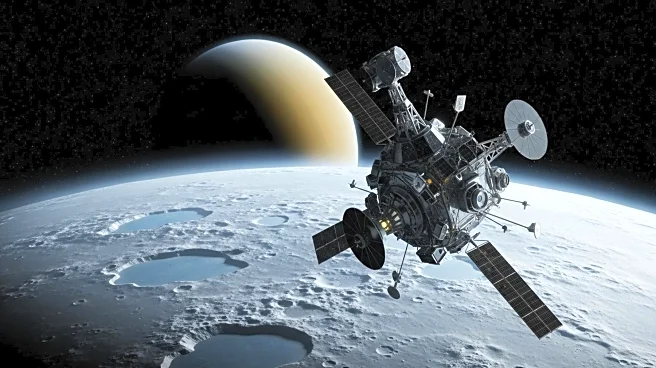What's Happening?
NASA is considering a mission to explore Enceladus, one of Saturn's moons, following discoveries by the Cassini probe that suggest the presence of organic molecules. These molecules, found in water plumes ejected from Enceladus's icy surface, indicate potential conditions for life. The European Space Agency has proposed a mission to Enceladus, but it is not scheduled to launch until 2042. NASA's concept, the Enceladus Orbilander, aims for a launch in 2038, leveraging capabilities such as the SpaceX Starship and direct fusion drive technology to reduce travel time to Saturn. The mission would involve an orbiter and a lander powered by radioisotope thermoelectric generators, similar to those used in previous deep space probes.
Why It's Important?
The exploration of Enceladus is significant as it could provide insights into extraterrestrial life beyond Earth. The presence of organic molecules and the conditions on Enceladus make it a prime candidate for habitability studies. Discovering life on Enceladus would have profound implications for our understanding of life in the universe and could influence future space exploration priorities. The mission could also drive technological advancements, particularly in propulsion and space travel, benefiting the broader scientific community and space industry.
What's Next?
NASA's proposed mission to Enceladus could accelerate the timeline for exploring the moon, potentially launching in 2038. The mission would aim to collect more plume material and attempt a landing, providing direct evidence of the moon's habitability. The success of this mission could lead to further exploration of other icy moons, such as Europa, and influence international collaboration in space exploration. The development of new technologies, like direct fusion drives, could revolutionize space travel, making distant celestial bodies more accessible.
Beyond the Headlines
Exploring Enceladus could shift the focus of extraterrestrial life searches from Mars to icy moons, which may offer more hospitable environments. The ethical considerations of contaminating alien worlds with human microbes could be less contentious on Enceladus, as it is not a target for human colonization. The mission could also foster international cooperation in space exploration, as multiple agencies may collaborate to share resources and expertise.









